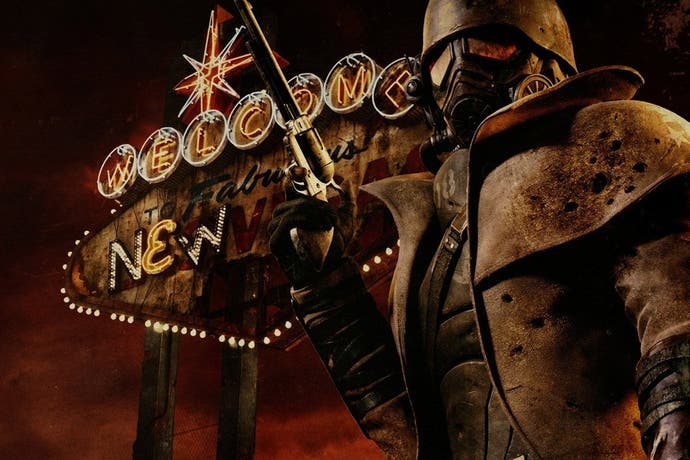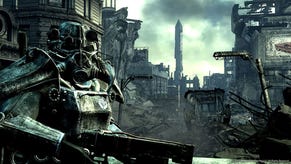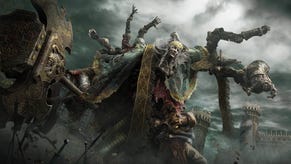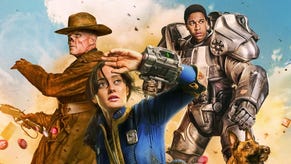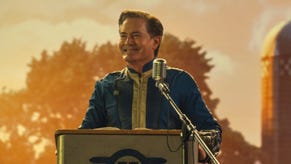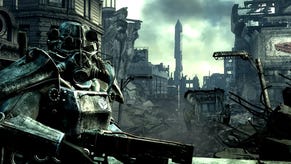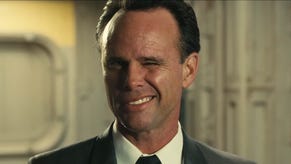The murky genius of Fallout: New Vegas
Just deserts.
Fallout 3 wasn't a bad game - far from it - but its successor Fallout: New Vegas was most definitely better. This was a sequel that righted Fallout 3's few wrongs, setting players loose in a grittier, grimier, morally murkier nuclear wasteland, a world far removed from the Disneyland apocalypse of its predecessor, where the light side was zany and the dark side was only ever awful rather than crushingly bleak. New Vegas was more mature and morally challenging. It was also, depending on your personal feelings about the politics of the main factions, utterly chilling.
I'm talking about moments such as Caesar and his Legion. I hated these retrogressive, unnecessarily savage bellends from the moment I first saw them at Nipton, and I hated them because what they represented was genuinely scary. The Legion lifestyle seemed far more horrific than Eulogy Jones' little operation in Fallout 3. Slavery was just one of several ingredients in Caesar's awfulness cake.
Yet the set-up never seems overly sensational, or underscored with villainous cliche. When you meet Caesar, he's terrifyingly sane. His vision is clear, his actions informed by persuasive logic, but his idea of Roman standards of human rights becoming the dominant moral philosophy was repugnant. In 2015, given the shocking brutality in the Middle East, it feels scary in a far starker fashion. Swap the Mojave desert for that terrifying stretch of Syria and Iraq, and Fallout New Vegas becomes tragically prescient.
The Legion set up a colossal moral barrier for me. A line in the sand drawn right down to the Earth's core, resulting in a sworn oath to cleanse the wasteland of their filth.This gave the whole game an intense moral cause. Aside the slavers, I never really hated anyone in Fallout 3, but I really hated the Legion. I took it so seriously that when I stumbled across them in Nelson, they all had to die. Then came another punch in the guts - the minefield in the no-man's-land on the way to camp Forlorn Hope. Seeing those NCR soldiers, missing limbs but still alive until their Legion-set booby traps go off, was grimmer than Nipton in some ways; a particularly malicious cruelty without any wider political purpose. It wasn't a warning and consolidation play like Nipton. It was seemingly done for fun as much as tactical expediency.
That's New Vegas's grittier air taken in one intoxicating breath. It seemed so much more mature because of its plausibility. New Vegas presented a murky ideological war between balanced factions rather than a comic-book fight between devils and angels. Fallout 3 pitted futuristic techno-knights of justice and Liberty Prime, a giant walking mech, against a shadowy and implausibly well equipped techno-elite hell-bent on world domination. New Vegas had a deeply flawed militaristic republic against revivalist fascists, with local power-player machinations slicing up the middle. Fallout 3 was Star Wars, New Vegas was Afghanistan.
The difference in complexity, and possibility of moral outcome, is obvious. This difference alone made New Vegas seem grounded in adult consideration and restraint, rather than turning the ridiculousness up to max here and there for extra cool points. That's not to say there isn't ridiculousness in New Vegas - there's lots of it - but it's always being tempered by down-low grit. For every giant plastic Tyrannosaur, there's a Boone who had to shoot his true love in a mercy killing.
Fallout New Vegas was great for more than its thematic maturity. Structurally it was more directed, but really it was every bit as free and open. Fallout 3's Washington, with its plazas of combat and tunnels of dread (for their labyrinthine nature as much as their inhabitants), left me feeling short-changed of freeform exploration and, more importantly, interesting loot. New Vegas stepped up and delivered, despite going to great effort to make sure you headed south from Goodsprings. On top of this were the additional skills (cannibalism meant you never went hungry in Hardcore Mode, especially if you levelled it up) and the best bit of all - a shedload of equipment and a bit of light crafting.
The expansion of systems is always welcome, and you always want a sequel to have more stuff, especially weapons. New Vegas gave me lots to seek out and play with. For this, I was eternally thankful. Working my way up to an anti-materiel rifle was a better incentive to go explore and accumulate XP and caps than any storyline, and became particularly joyful when I finally cleared my way back to Goodsprings from the north, helped ably by said rifle with explosive and incendiary rounds. When the Gunrunner's Arsenal arrived, I openly wept tears of joy for a week.
There's so much to reminisce about in Fallout New Vegas. Meeting Mr House, abortive stealth-killing runs through Caesar's camp, the climb to Tabitha's radio station, running the Boomer's gauntlet, slaughtering the Powder Gangers in their pissy prison, solving the mystery of the Ultra Luxe, finding Chinese Stealth Armor at the Hoover Dam. Getting a new brain for an ailing dog, freeing the slaves at Cottonwood Cove, seeing the BoS in hiding and crisis, Vault 22. The DLC was pretty awesome too - Old World Blues was a deranged jaunt for loot (and where New Vegas took a rare step over the plausibility line), Honest Hearts was quite the landscape and Dead Money was intense, but New Vegas's hardened soul found a crystalline summation walking the Lonesome Road.
Here, New Vegas's grand vista narrowed into a winding corridor of desolation and decay, with a huge moral choice at the end. War is all too easily trivialised in video games. Such is the reduction of consequence, the appeasement of players who never want to restart anything, and the chase for sensationalist set-pieces. The increasingly chaotic landscapes of the Lonesome Road, from ruined military base into a city that felt truly shattered, seemed to pull Fallout's key theme into sharper focus. The sheer finality of a global nuclear exchange was no longer a backdrop, but comes to the fore. It was serious business.
In Fallout 3, you get to set off a nuke in the early hours of the game, to serve a rich elite and as a side-quest easter egg. At the end of the Lonesome Road, you get to set off a nuke to serve your moral alignment - or explicitly chose not to. To me, the tougher combat and the ruined, isolated canyon (becoming progressively more illustrative of the effects of nuclear war) pulled me into pacifism in a remarkable way. It was story, game and environment unifying to provoke something profound - the belief that no nuclear weapon should ever fly again.
For all my comparative criticism of Fallout 3, I absolutely loved it. I even loved Mothership Zeta. It's just that New Vegas transcended it. It seemed to have more of everything I loved and less of the things I didn't. I just hope Bethesda has bottled a bit of that magic - the kind that came from Josh Sawyer, Chris Avellone and Obsidian - for Fallout 4. When it came to the end of New Vegas, I took the Wargames route - I chose not to play. The Legion must die, but the NCR is doing it wrong. The rest are silly, irresponsible or sociopathic, so I left the Hoover Dam as it was, a standoff between ideology and destiny, at loggerheads forever. I took to the wasteland as some condescending protector of the nameless settlers and wandering traders, killing all the violent things for the people this world depends on. It wasn't a formal ending, but it should have been.
The fact that I'm satisfied leaving it in limbo (and without feeling spineless) underlines the greatness in New Vegas's moral complexity. It was the perfect ending for a player who didn't want to watch the world burn, but just wanted it to leave it a nicer place.
